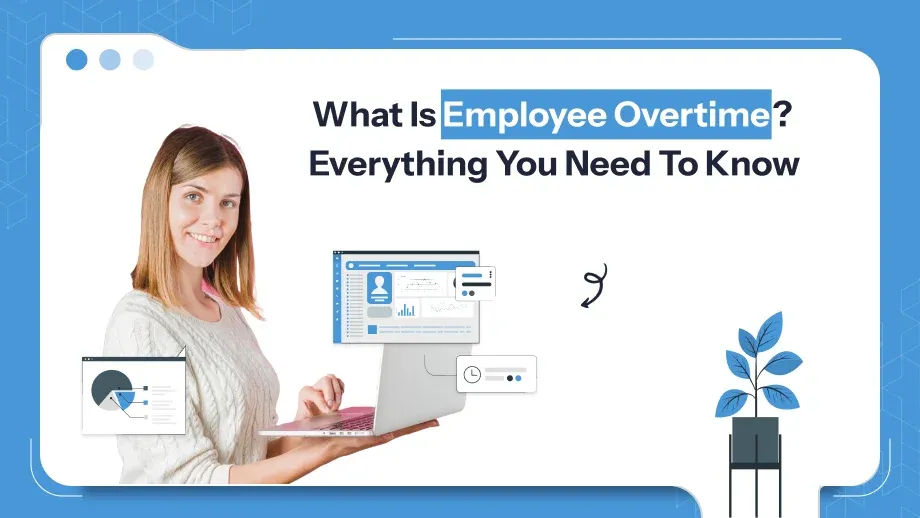
It refers to the extra hours worked by an employee beyond the standard or contractual hours of work. For many organizations, overtime is a tool meant to meet tight deadlines and manage hectic seasonal workloads or unusual demands. However, to abide by labor laws, employee satisfaction, and minimize costs, companies need to understand and manage the overtime of employees. In this blog, we’ll be discussing the concept of employee overtime, the legal framework surrounding it, and best practices for effective management of overtime.
What Is Employee Overtime?
Employee overtime is the additional time that employees give to their work outside the scheduled working hours agreed with them. Although overtime is required to fulfill the organizational objectives, it has to be managed so that fairness and compliance with regulations are not compromised.
Key Elements of Employee Overtime
- Standard Work Hours: These are typically defined by company policy or labor law. For example, in India, the standard working day is 8 hours.
- Extra Hours: Any hour spent more than the normal working hours is considered overtime for employees.
- Eligibility for Overtime: Not all employees are eligible for overtime pay. Rules differ from job roles, salary scales, and local laws such as the overtime act in India.
Some of the most common sectors where overtime work is found include manufacturing, healthcare, and retail, especially during peak business periods.
Why Is Employee Overtime Important?
Employee overtime is crucial for productivity and meeting business objectives, especially in high-demand periods. It gives organizations the flexibility to respond to workload surges without posing operations inefficiency. These are eight significant reasons why the use of overtime is important:
Flexibility in Operations
Overtime helps businesses manage unanticipated workloads, seasonal demands, or deadlines. It allows the business to maintain service levels without immediately having to hire extra staff, which makes overtime hours for employees a very important operational flexibility tool.
Increased Productivity
By extending work hours when necessary, companies can complete urgent tasks and meet customer demands. Strategic use of overtime work boosts productivity without impacting long-term staffing plans.
Enhancing Employee Engagement
Employees engagement who are compensated fairly for their overtime efforts are more likely to stay engaged and motivated. This alignment of salary and overtime demonstrates the company’s commitment to valuing its workforce.
Employee Satisfaction Through Compensation
Fair compensation for overtime wages ensures employees feel rewarded for their extra effort. Adhering to the overtime law in India fosters trust and creates a positive work environment.
Avoiding Delays
Overtime ensures projects and tasks stay on schedule during critical times. This is particularly important in industries like manufacturing and retail, where delays can lead to customer dissatisfaction.
Compliance with Labor Laws
It also helps the business stay within the overtime act in India, thus avoiding penalties and legal repercussions. Fair overtime practices enhance the company’s reputation as an ethical employer.
Supporting Temporary Workload Peaks
The overtime act of India and labor laws of all countries are supposed to offer proper overtime pay for overtime working hours. Therefore, the employer must update with rules and regulations in order not to suffer penalties and ensure the workplace is complaint-free.
Legal Regulations Around Overtime
Overtime Act in India and other Labor laws of the world provide employees with proper compensation for their extra work. Thus, employers must be well-informed of the rules so as not to suffer from penalties or maintain an improper workplace.
Overtime Laws in India
- Eligibility: Employees who earn less than a certain amount of salary are eligible for overtime wages.
- Compensation: The law mandates that employees be paid at least 1.5 times their regular hourly wage for overtime.
- Working Hour Limits: The overtime law in India also specifies the maximum number of hours an employee can work, including overtime.
Compliance with these laws is important to maintain a harmonious relationship with employees and avoid legal disputes.
How to Calculate Overtime Pay?
Calculating the correct salary and overtime is very crucial to transparency and compliance. Here is the step-by-step process:
- Calculate Regular Pay: The hourly rate of an employee would be determined through their monthly salary.
- Determine Overtime Hours: The work hours are tracked accurately through the attendance management system software.
- Apply Overtime Rates: The overtime hours should be multiplied by the appropriate rate, for instance, 1.5 times or 2 times the hourly wage.
Modern technology such as HRMS Payroll Software in India simplifies this process and reduces errors.
Common Challenges in Managing Employee Overtime
Managing overtime effectively is critical for maintaining compliance, controlling costs, and keeping employees satisfied. However, it comes with several challenges:
Tracking Overtime Accurately
Manual processes are often difficult for many businesses to track overtime hours. It can cause payroll disputes, compliance issues, and dissatisfied employees. With tools such as attendance management system software HRMS and payroll software, overtime tracking becomes easy through automated data collection.
Preventing Employee Burnout
Overuse of overtime by employees will cause burnout and a loss of productivity while also increasing the turnover rate. A burnout employee will certainly disengage and is a determinant factor to the organization’s failure.
Managing Costs
The overtime law of India has to be adhered to as any misrepresentation or omission, like about eligibility for overtime wages, attracts fines and demoralizes the company.
Staying Compliant with Laws
Adherence to the overtime law in India is crucial to avoid legal penalties. Misinterpretation or ignorance of rules, such as eligibility for overtime wages, leads to fines and a tarnished reputation of the company.
Ensuring Fairness
It’s important to ensure fairness in allocating overtime work. Favoring certain employees or failing to offer equal opportunities for overtime can lead to dissatisfaction and resentment.
Best Practices for Managing Employee Overtime
To handle employee overtime effectively, businesses should adopt strategies that ensure compliance, optimize operations, and keep employees satisfied.
Set Clear Overtime Policies
Define who is eligible for employees’ overtime, the procedures for approval, and the rate of overtime wages in compliance with the overtime act in India. Transparent policies reduce misunderstandings and foster trust.
Use Technology for Accurate Tracking
Leverage tools like best HRMS tools and attendance management system software to record work hours automatically. This ensures accurate tracking of overtime hours and simplifies payroll calculations.
Communicate Effectively
Keep employees informed about the company’s overtime rules. Clear communication helps employees understand their rights, eligibility for overtime wages, and how they can contribute without overextending themselves.
Prioritize Employee Well-being
The need to reduce over-reliance on overtime from employees should be achieved through realistic deadlines and frequent breaks. Wellness programs would prevent burnout and maintain the workforce’s motivation.
Monitor Trends and Adjust Workloads
Analyzing human resource management tools provides patterns of overtime works. The problem of excessive overtime can be addressed by either redistributing the workloads or hiring temporary staff during peak times.
The Role of Technology in Managing Overtime
Technology has a lot to do with making the management of overtime streamlined, reducing errors, and compliance with labor laws. Here are eight ways technology supports effective overtime management:
Accurate Time Tracking
Modern tools like attendance management system software record employee work hours automatically, ensuring precise tracking of overtime hours and eliminating manual errors.
Automated Overtime Calculations
Tools like HRMS Payroll Software in India automatically calculate overtime wages, factoring in labor laws such as the overtime act in India. This saves time and ensures accuracy in payroll processing.
Real-Time Monitoring
HR managers can use human resource management tools to monitor overtime trends in real-time. This data helps in identifying departments with excessive overtime and addressing potential issues proactively.
Employee Self-Service
Many hr software india solutions offer self-service portals where employees can check their overtime work, request approvals, and track their earnings. This transparency enhances employee satisfaction.
Cost Management
By analyzing overtime data using the best HRMS tools, businesses can identify patterns and control unnecessary costs. This helps allocate resources more effectively.
Integration with Other Systems
Advanced HRM software for small business integrates seamlessly with other business tools, such as project management and payroll systems. This ensures that over time data flows smoothly across platforms, improving overall efficiency.
Data-Driven Decisions
Analytics from the best human resource management system software can provide actionable insights, such as identifying overworked employees or evaluating the need for additional staff during peak seasons.
Conclusion
Effective management of employee overtime is the key for a business to stay compliant, in control, and gain the satisfaction of employees. Clear overtime policies, modern tools such as best HRMS tools, and worker welfare can help organizations optimize their overtime practices. Investing in technology like HRMS payroll software in india or attendance management system software ensures accurate tracking and compliance with the overtime act in India. Understanding the importance of employees overtime and adopting best practices can help businesses create a more productive and engaged workforce.







